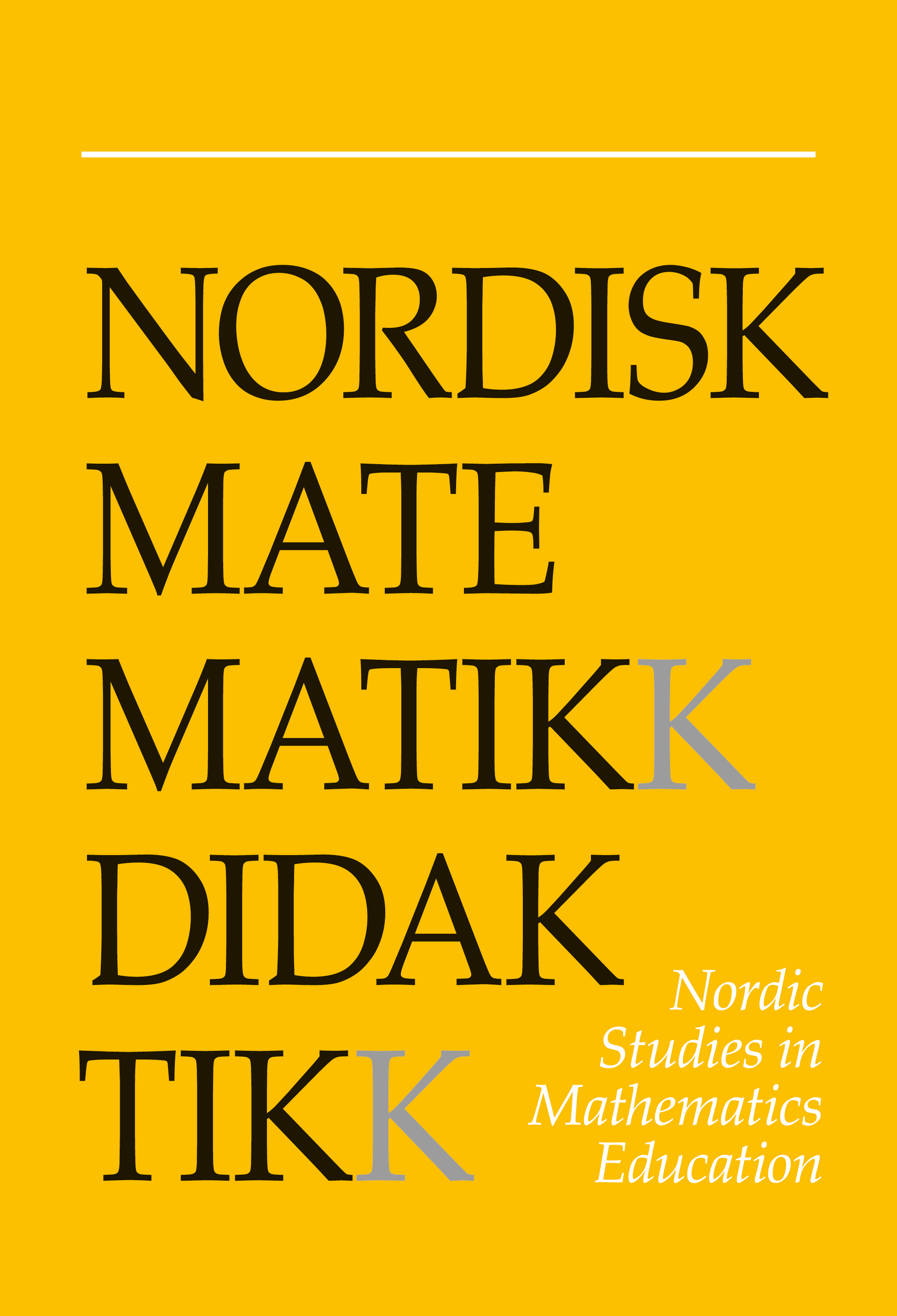Stimulating critical mathematical discussions in teacher education: use of indices such as the BMI as entry points
DOI:
https://doi.org/10.7146/nomad.v22i4.148917Abstract
The main purpose of our research project is to gain insight into, and develop teaching on indices and their applications in society. In this paper, the focus is to present insights into teachers’ reflections when discussing the Body Mass Index (BMI). Skovsmose ́s concept of mathemacy, and source criticism, are chosen as conceptual framework. The data analysed were collected in a numeracy across the curriculum class with practising teachers. The findings show that the practising teachers engaged in meaning making of the index formula, and they critically discussed how BMI is used in society and the role the BMI index can have in our lives. We gain insight into the potential of such an index for developing teachers’ awareness of the application of mathematics to the real world and the issues it raises, both for the teachers and for ourselves.
References
Aguilar, M. S. & Zavaleta, J. G. M. (2012). On the links between mathematics education and democracy: a literature review. Pythagoras, 33 (2). https://doi.org/10.4102/pythagoras.v33i2.164
Barbosa, J. C. (2006). Mathematical modelling in classroom: a socio-critical and discursive perspective. ZDM, 38 (3), 293-301. https://doi.org/10.1007/BF02652812
D'Ambrosio, U. (1990). The role of mathematics education in building a democratic and just society. For the Learning of Mathematics, 10 (3), 20-23.
Doerr, H. & English, L. D. (2003). A modeling perspective on students' mathematical reasoning about data. Journal for Research in Mathematics Education, 34 (2), 110-136. https://doi.org/10.2307/30034902
English, L. (2006). Mathematical modelling in the primary school: children's construction of a consumer guide. Educational Studies in Mathematics, 63 (3), 303-323. https://doi.org/10.1007/s10649-005-9013-1
English, L. & Watters, J. (2004). Mathematical modelling in the early school years. Mathematics Education Research Journal, 16 (3), 59-80. https://doi.org/10.1007/BF03217401
Goetz, H.-W. (2000). Proseminar Geschichte: Mittelalter. Stuttgart: Ulmer.
Greer, B. & Skovsmose, O. (2012). Seeing the cage? The emergence of critical mathematics education. In O. Skovsmose & B. Greer (Eds.), Opening the cage. Critique and politics of mathematics education (pp. 1-19). Rotterdam: Sense Publishers. https://doi.org/10.1007/978-94-6091-808-7_1
Greer, B., Verschaffel, L. & Mukhopadhyay, S. (2007). Modelling for life: mathematics and children's experience. In W. Blum, P. Galbraith, H. Henn & M. Niss (Eds.), Modelling and applications in mathematics education (pp. 89-98). New York: Springer. https://doi.org/10.1007/978-0-387-29822-1_7
Hall, J. & Barwell, R. (2015). The mathematical formatting of obesity in public health discourse. In S. Mukhopadhyay & B. Greer (Eds.), Proceedings of the eighth International Mathematics Education and Society Conference (pp. 557-570). Portland: Ooligan Press, Portland State University.
Jablonka, E. (2003). Mathematical literacy. In A. J. Bishop, C. Keitel, J. Kilpatrick & F. K. S. Leung (Eds.), Second international handbook of mathematics education (Vol. 1, pp. 75-102). Dordrecht: Kluwer. https://doi.org/10.1007/978-94-010-0273-8_4
Julie, C. (2002). Making relevance in mathematics teacher education. In I. Vakalis, D. Hughes-Hallett, C. Kourouniotis, D. Quinney & C. Tzanakis (Eds.), Proceedings of the 2nd International Conference on the Teaching of Mathematics at the undergraduate level. Hoboken: Wiley. Retrieved from http://citeseerx.ist.psu.edu/viewdoc/download?doi=10.1.1.495.9845&rep=rep1&type=pdf
Lund, E. (2011). Historiedidaktikk. Oslo: Universitetsforlaget.
Ministry of Education and Research (2010). Mathematics subject curriculum. Retrieved from http://www.udir.no/kl06/MAT1-04/Hele/Formaal?lplang=eng
Skovsmose, O. (1992). Democratic competence and reflective knowing in mathematics. For the Learning of Mathematics, 12 (2), 2-11.
Skovsmose, O. (1994). Towards a philosophy of mathematics education. Dordrecht: Kluwer. https://doi.org/10.1007/978-94-017-3556-8
Skovsmose, O. (1998). Linking mathematics education and democracy: citizenship, mathematical archaeology, mathemacy and deliberative interaction. ZDM, 30 (6), 195-203. https://doi.org/10.1007/s11858-998-0010-6
Skovsmose, O. (2004). Critical mathematics education for the future. In M. Niss & E. Emborg (Eds.), Proceedings of the 10th International Congress on Mathematical Education. IMFUFA, Roskilde University.
Skovsmose, O. (2005). Travelling through education: uncertainty, mathematics, responsibility. Rotterdam: Sense Publishers. https://doi.org/10.1163/9789087903626
Skovsmose, O. & Greer, B. (2012). Opening the cage? Critical agency in the face of uncertainty. In O. Skovsmose & B. Greer (Eds.), Opening the cage. Critique and politics of mathematics education (pp. 369-386). Rotterdam: Sense Publishers. https://doi.org/10.1007/978-94-6091-808-7_19
Vithal, R. (2012). Mathematics education, democracy and development: exploring connections. Pythagoras, 33 (2). https://doi.org/10.4102/pythagoras.v33i2.200
Downloads
Published
How to Cite
Issue
Section
License

This work is licensed under a Creative Commons Attribution-NonCommercial-ShareAlike 4.0 International License.



